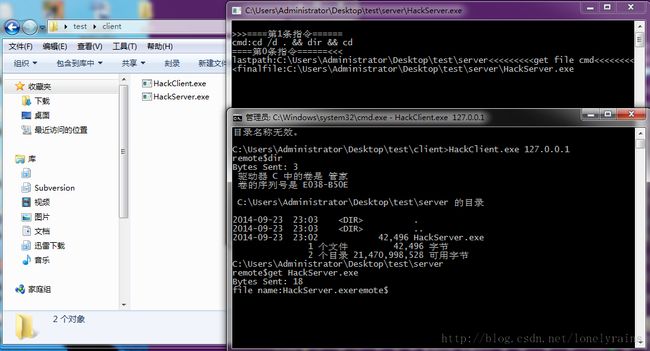超级轻量的远程命令行客户端和服务端(含文件传输)
本文由 @lonelyrains 出品,转载请注明出处。
文章链接: http://blog.csdn.net/lonelyrains/article/details/10171649
平台:windows (linux同理)
原理:客户端连接上服务端之后,先监听键盘输入,将键盘输入的cmd指令保存并发送给服务端;服务端保存并通过调用命令行执行,获取命令行执行结果发送给客户端。如果是 获取文件命令,则读取文件,并将文件发送给客户端
代码:源码下载链接
// 核心代码
int getfile(const char *path,SOCKET ClientSocket,const char *file)
{
int rtn = 0;
char buffer[DEFAULT_BUFLEN];//
string finalfile = string(path)+"\\"+string(file);
printf("finalfile:%s",finalfile.c_str());
FILE *fp = fopen(finalfile.c_str(),"rb");
while(1)
{
int size = fread(buffer,1,sizeof(buffer),fp);
if(size == 0)
{
if(feof(fp))
{
#if 0
if(-1 ==sendData(ClientSocket,buffer,size,size))
{
rtn = -1;
IF_ERROR_GOTO_END;
}
#endif
break;
}
else if(ferror(fp))
{
rtn = ferror(fp);
IF_ERROR_GOTO_END;
}
}
else
{
if(-1 ==sendData(ClientSocket,buffer,size,size))
{
rtn = -1;
IF_ERROR_GOTO_END;
}
}
}
END:
fclose(fp);
return rtn;
}
//http://stackoverflow.com/questions/478898/how-to-execute-a-command-and-get-output-of-command-within-c
int exec(char *lastpath,int pathsize,char* cmd,SOCKET ClientSocket,string out)
{
//命令结果字符串的最后一行即是当前路径;不能放在最前面,要获取的是执行完cmd之后的路径
char finalcmd[0x300] = "";
char buffer[0x300];//
int rtn = 0;
string result = "";
strcpy(finalcmd,(string("cd /d ") + string(lastpath) + string(" && ") +
string(cmd) + string(" && cd ")).c_str()); // 2>&1 ) && cd 方式添加了错误信息和显示当前路劲,但是报错时只显示最后那个错,不会报告路径,所以不获取错误信息好了
FILE* pipe = _popen(finalcmd, "r");
static int i=0;
printf("\n>>>====第%d条指令======\ncmd:%s\n====第%d条指令======<<<\n",i,finalcmd,i++);
if (!pipe) return -1;
while(!feof(pipe))
{
if(fgets(buffer, sizeof(buffer), pipe) != NULL)
{
result += buffer;
//printf("%s",buffer);
int sendLen = 0;
if(-1 ==sendData(ClientSocket,buffer,strlen(buffer),sendLen))
{
rtn = -1;
IF_ERROR_GOTO_END;
}
if(strlen(buffer))
{
ZeroMemory(lastpath,pathsize);
strcpy(lastpath,buffer);
}
ZeroMemory(buffer,sizeof(buffer));
}
}
_pclose(pipe);
pipe = NULL;
out = result;
END:
if(pipe != NULL)
{
_pclose(pipe);
pipe = NULL;
}
if(lastpath[strlen(lastpath)-1] == '\n')
lastpath[strlen(lastpath)-1]='\0';//去掉最后的回车
printf("lastpath:%s",lastpath);
return rtn;
}
int sendData(SOCKET ClientSocket,char *buf,int bufLen,int &sendLen)
{
// Echo the buffer back to the sender
int rtn = 0;
rtn = send( ClientSocket, buf, bufLen, 0 );
sendLen = rtn;
if (rtn == SOCKET_ERROR) {
printf("send failed with error: %d\n", WSAGetLastError());
}
//printf("Bytes sent: %d\n", iSendResult);
return rtn;
}
测试:
1、开启服务端进程
2、从命令行打开用户端进程 HackClient.exe 127.0.0.1
3、使用dir命令浏览服务端程序的目录
4、从服务端程序获取某文件,从下面的截图可见,最终HackServer.exe拷贝过来了
截图:
注意:
1、如果编译报错没有定义addrinfo结构体,可能是因为用vc6编译的,而vc6自带的ws2tcpip.h文件里是没有定义这个结构体的,可以用vs2008编译
2、使用时,先打开Server的执行文件Server.exe,再打开Client.exe。注意Client.exe的参数是服务端的IP地址
3、需要保证服务端的端口可以正常打开监听
参考:
http://stackoverflow.com/questions/478898/how-to-execute-a-command-and-get-output-of-command-within-c
